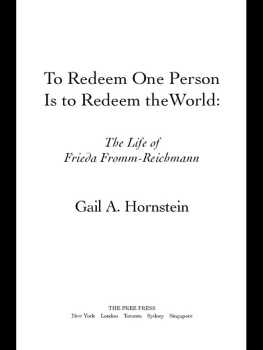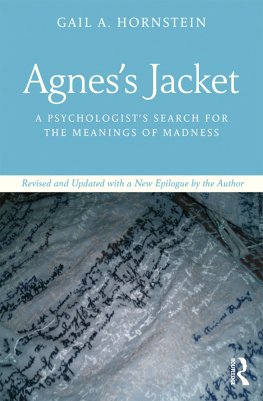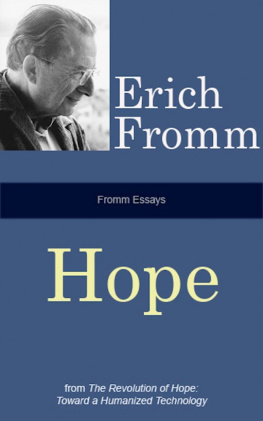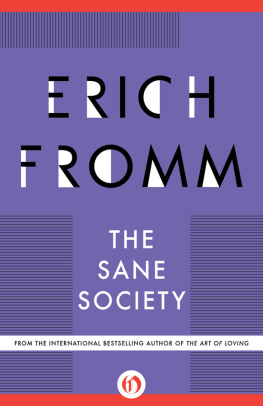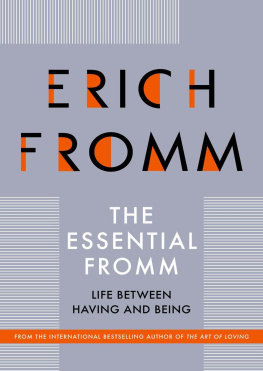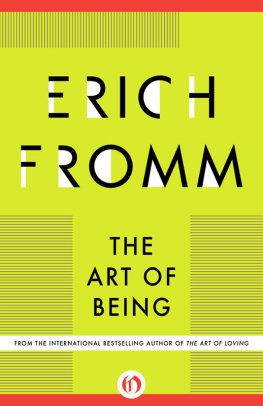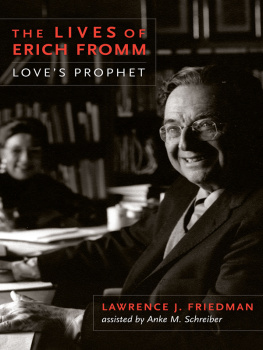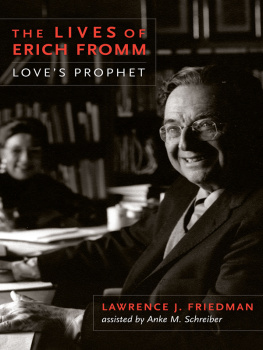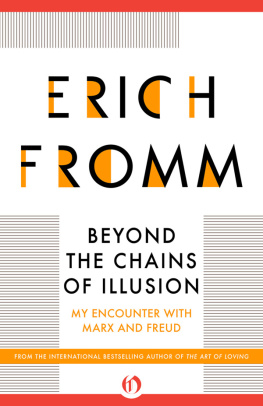Gail A. Hornstein - To Redeem One Person Is to Redeem the World: A Life of Frieda Fromm-Reichmann
Here you can read online Gail A. Hornstein - To Redeem One Person Is to Redeem the World: A Life of Frieda Fromm-Reichmann full text of the book (entire story) in english for free. Download pdf and epub, get meaning, cover and reviews about this ebook. year: 2002, publisher: Free Press, genre: Non-fiction. Description of the work, (preface) as well as reviews are available. Best literature library LitArk.com created for fans of good reading and offers a wide selection of genres:
Romance novel
Science fiction
Adventure
Detective
Science
History
Home and family
Prose
Art
Politics
Computer
Non-fiction
Religion
Business
Children
Humor
Choose a favorite category and find really read worthwhile books. Enjoy immersion in the world of imagination, feel the emotions of the characters or learn something new for yourself, make an fascinating discovery.
- Book:To Redeem One Person Is to Redeem the World: A Life of Frieda Fromm-Reichmann
- Author:
- Publisher:Free Press
- Genre:
- Year:2002
- Rating:3 / 5
- Favourites:Add to favourites
- Your mark:
To Redeem One Person Is to Redeem the World: A Life of Frieda Fromm-Reichmann: summary, description and annotation
We offer to read an annotation, description, summary or preface (depends on what the author of the book "To Redeem One Person Is to Redeem the World: A Life of Frieda Fromm-Reichmann" wrote himself). If you haven't found the necessary information about the book — write in the comments, we will try to find it.
In this marvelously researched and moving biography closely grounded in Frieda Fromm-Reichmanns work, Gail Hornstein brings back to life the maverick psychiatrist who accomplished what Freud and almost everyone else thought impossible: successfully treating schizophrenics and other seriously disturbed mental patients with intensive psychotherapy, not lobotomy, shock treatment, or drugs.
To Redeem One Person Is to Redeem the World tells the extraordinary life story of the German-Jewish refugee analyst, who was the first wife of Erich Fromm. Written with unprecedented access to a rich archive of Frieda Fromm-Reichmanns clinical work at the legendary Chestnut Lodge Hospital in Rockville, Maryland, and using newly discovered family records and documents from across Europe and the United States, this is the definitive biography of a remarkable woman.
Best known to millions as the courageous therapist in I Never Promised You a Rose Garden, Joanne Greenbergs bestselling chronicle of madness and recovery, Fromm-Reichmann (1889-1957) is a fascinating and controversial figure in twentieth-century psychiatry. To Redeem One Person Is to Redeem the World traces the story of her life and education, from a loving childhood as the eldest of three daughters in an Orthodox Jewish family to medical school at seventeen, as one of the first women admitted to study at a Prussian university.
During World War I, Fromm-Reichmann took charge of a military hospital in Knigsberg, transforming it into a pioneering center for the treatment of brain injury. By her mid-thirties, she had opened her own psychiatric sanitarium in Heidelberg, where she and her staff put into practice a unique and hopeful integration of psychotherapy and tikkun, the Jewish ethical principle that every person is worth saving. At thirty-six, she had an affair with and then married her patient, Erich Fromm, later the celebrated author of Escape from Freedom, The Art of Loving, and other psychological classics. Her close friends and colleagues in pre-World War II Germany included some of the most visionary intellectuals and therapists of the era: Martin Buber, Karen Horney, Franz Rosenzweig, Gershom Scholem, and Georg Groddeck, among others.
Hornstein recounts Fromm-Reichmanns dramatic escape from Nazi Germany, exile in France and Palestine, and her flight to the United States, where she found asylum at a tiny hospital outside Washington, D.C. Over the following decades, Fromm-Reichmann would emerge as the most distinguished figure at Chestnut Lodge, a mental hospital unlike any other -- intellectually radical, yet filled with warm family feeling and deeply respectful of individual difference. Fromm-Reichmann was not only pivotal in creating a beacon of hope at Chestnut Lodge, which stood alone as the place where the sickest patients could go to be cured. She was also a maverick in her field -- the only prominent woman analyst of her day to write about schizophrenia, not femininity or children. And she had little interest in the arcane theoretical disputes that obsessed most of her colleagues; curing patients was her consuming goal.
As the pendulum swings back from psychiatrys addiction to drugs as the sole treatment for mental illness, Fromm-Reichmanns breadth of vision makes this biography of a heroic, yet all-too-human, woman a timely and compelling work.
Gail A. Hornstein: author's other books
Who wrote To Redeem One Person Is to Redeem the World: A Life of Frieda Fromm-Reichmann? Find out the surname, the name of the author of the book and a list of all author's works by series.

